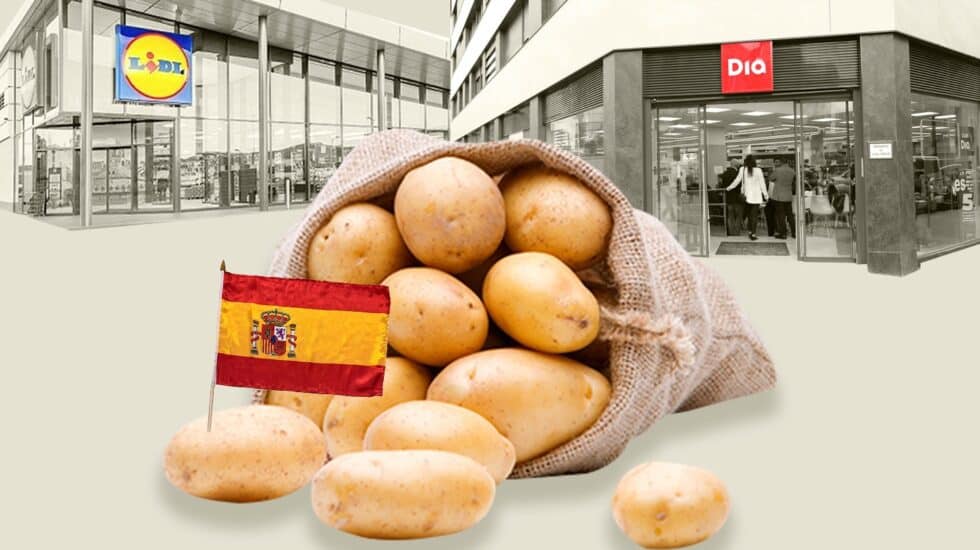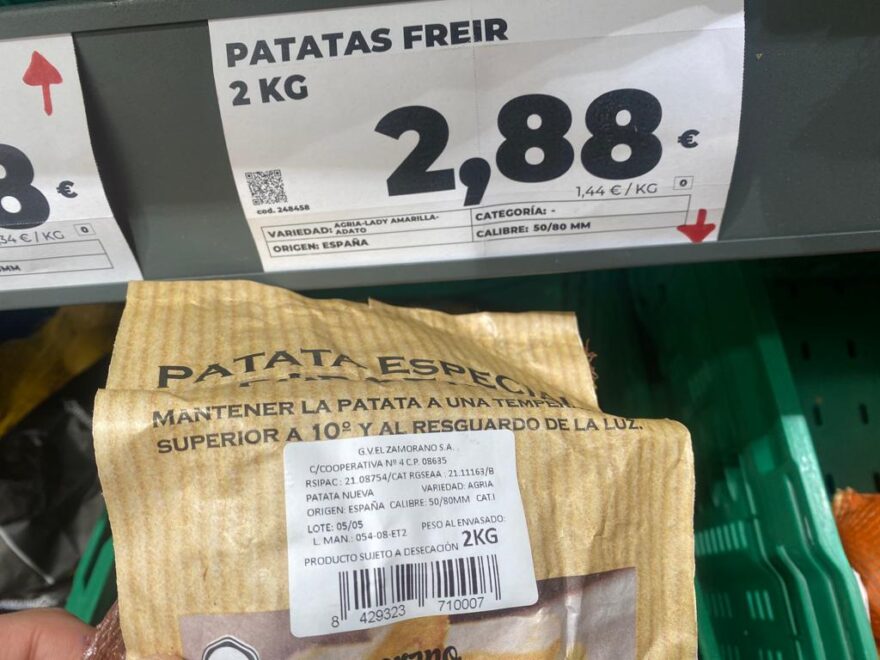

An illustration of the confrontation between farmers and supermarkets over potatoes
The alleged fraud has caused controversy among three professional agricultural organizations in Spain. ASADJA, UPA And COAGand supermarkets lidl And Day. ASAJA’s shouts directly point to Lidl while UPA and COAG share their accusations with Dia. “Young potatoes are paid by the farmer at a price of 0.6 euros per kilogram, so Lidl cannot offer them at a price of 0.9 euros per kilogram, as it did before. For the price and what the manufacturer is paid for, this is not a new potato of domestic origin. Most likely, this is an old potato that has lain in the chamber for several months and was brought from France. Seat is sold as a Mercedes,” he notes in a conversation with Independent, Ricardo Serravice president of the ASAJA and president of the Andalusian delegation.
Planting potatoes in Spain is divided into two cycles: sown in late spring and harvested in summer, and the so-called verdete potatoes, when planted in autumn and harvested in winter. Potatoes pulled out of the ground at this time of the year “give fewer kilograms of produce because the temperature is not the same as in spring, but they are of very good quality and, above all, fresh,” explains Serra, who denounces this action. one that accuses Lidl of harming the consumer and the producer: “Whoever goes to the supermarket for shopping does it very cheaply, but they are deceived because they take a product that does not match what they want. For the farmer, these fraudulent maneuvers are fatal because they bring down the price of the land, and the farmer, instead of selling at 0.6 euros per kilogram, sells at 0.4. That’s how you lose money for work.”
The ASAJA spokesperson highlights the big differences between new potatoes that are consumed after harvest and old potatoes that reach the customer after the season in stock. “This is very noticeable when the potatoes are old, because when they are fried, their behavior is completely different from the behavior of young potatoes. The new one is swollen and yellow, while the old one turns black when fried and becomes sweet because the starch breaks down into sugars. In short, the consumer is being deceived because these potatoes are neither new nor of Spanish origin.” Since Dia moved into Independent This information is false, “he only sells correctly labeled canned potatoes” and none of his suppliers supply them with new potatoes, “only canned potatoes as correctly stated on their label”, although as confirmed by this newspaper on the shelves Yes , there is a new potato, although it is true that it is labeled as Spanish and its price is much higher than that criticized by farmers, since it is 1.44 euros per kilogram, and not 0.9, as the ASAJA condemns in some cases UPA and COAG.

Farmers demand government accountability
Locally, they find it “inexplicable” that new potatoes of national origin are sold on these dates for 0.9 euros per kilogram, when the farmer is paid 0.60 euros. ASAJA has directly asked the Ministry of Agriculture to act in defense of the Spanish potato: “We demand compliance with current legislation, control and prevention of consumer fraud,” said its director, Pedro Barato. The complaint extends to the AICA (Agencia de Información y Control Alimentarios) and the Ministry of Consumption, Serra comments: “The consumer must go to the relevant site, take samples and demand documentation proving that the potatoes are Spanish, do not go to Lidl may think that they have bought new potatoes and deceive them.”
UPA, through its alliance with the COAG in Castile and León, demanded that the General Directorate of Consumption of the Junta of Castile and León, as well as AICA and the Ministry of Consumption, act immediately and take appropriate action to open the files and impose severe sanctions on Lidl and Dia. “Otherwise, we will understand that both the central government and the regional government, leaving their functions, protect distribution from the interests of farmers and consumers,” they decided.
ASAJA appealed to the common sense and responsibility of the food chain, “and especially distribution, not to use the potato as a marketable product, resorting to batches of imported potatoes or lower quality potatoes, trying to destabilize prices and apply pressure. so that national producers sell at a loss.” In addition, ASAJA asks the Ministry of Agriculture to exercise the utmost discretion when it comes to enforcing the Agri-Food Chain Law.
According to ASAJA, about 2.5 million tons of potatoes are consumed in Spain, of which about 1.2 million are of domestic origin, while the rest are imported, mainly from France. The three organizations agree that low profitability thresholds are the main reason for the reduction in potato acreage, so it is important not to lose more production as it is a vital production for the country.
Source: El Independiente